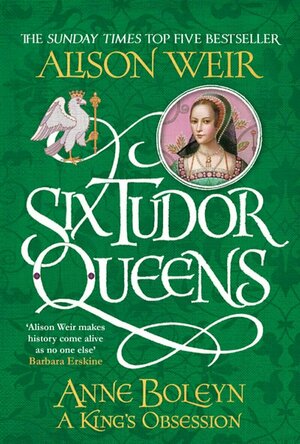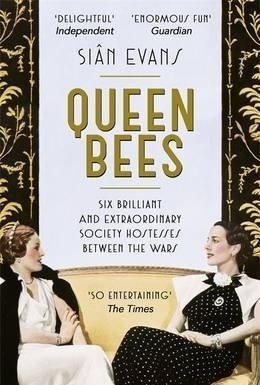
A Tip for the Hangman
Book
Christopher Marlowe, a brilliant aspiring playwright, is pulled into the duplicitous world of...
Lyndsey Gollogly (2893 KP) rated Anne Boleyn: A Kings Obsession (Six Tudor Queens #2) in Books
Oct 10, 2021
Book
Anne Boleyn:A Kings Obsession (Six Tudor Queens book 2)
By Alison Weir
Once read a review will be written via Smashbomb and link posted in comments
Anne Boleyn: A King's Obsession by bestselling historian Alison Weir, author of Katherine of Aragon: The True Queen, is the second captivating novel in the Six Tudor Queens series. An unforgettable portrait of the ambitious woman whose fate we know all too well, but whose true motivations may surprise you. Essential reading for fans of Philippa Gregory and Elizabeth Chadwick.
'Offers a spellbinding solution to the mystery of Anne's true nature . . . Enthralling' Sarah Gristwood
The young woman who changed the course of history.
Fresh from the palaces of Burgundy and France, Anne draws attention at the English court, embracing the play of courtly love.
But when the King commands, nothing is ever a game.
Anne has a spirit worthy of a crown - and the crown is what she seeks. At any price.
ANNE BOLEYN. The second of Henry's Queens. Her story.
History tells us why she died. This powerful novel shows her as she lived.
I absolutely love how this author writes! I was hooked from the start with this book. Anne Boleyn is one of those women who started with such good intentions but then became all dark and twisted! I have zero sympathy for how her life played out but found her story totally captivating. This is definitely a series worth reading!
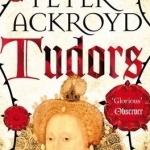
Tudors: A History of England Volume II: Volume II
Book
Rich in detail and atmosphere and told in vivid prose, Tudors recounts the transformation of England...
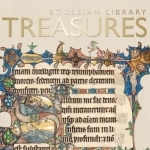
Bodleian Library Treasures
Book
Since its foundation in 1602, the Bodleian Library has acquired manuscripts, printed books, maps,...
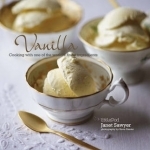
Vanilla: Cooking with the King of Spices
Book
Brought to Europe by Spanish explorer Hernan Cortes in the 16th century, vanilla became something of...
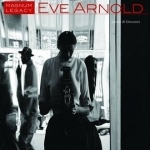
Eve Arnold: Magnum Legacy
Book
Eve Arnold (1912 - 2012) was born to a poor immigrant family in Philadelphia and became a...
Patek Philippe
Book
The definitive history of the world-renowned watchmakers, Patek Philippe. Founded in Geneva in 1839,...
Deborah (162 KP) rated Highland Surrender in Books
Dec 21, 2018
Sadly, Fiona, the heroine, appears as a right Little Madam for most of the first part of the book. Even after feeling betrayed by her brothers, she is unable to reasonably question anything beyond the clan indoctrination and acts simply like a spoilt child. It's quite hard to see why Myles falls for her at all.
That said, overall this isn't a bad book. I think a bit more on the history side would have made this a more solid and exciting novel, as the ending was really rather good, but it seemed that it couldn't decide if it wanted to be an historical novel, with a romance element (think Elizabeth Chadwick) or something more akin to a bodice ripper (and nothing wrong with that!). You started off feeling there was a bigger plot at play, but this seemed to get a bit lost in the middle, before a quite exciting ending after all.
Not sure it's worth a second read, but I'd consider this author again in the future.
graveyardgremlin (7194 KP) rated The Other Countess (The Lacey Chronicles, #1) in Books
Feb 15, 2019
The story itself isn't exactly original and doesn't go into any unfamiliar territory, but it's ably told and fairly inoffensive, making it suitable for older teens (there are numerous allusions to sexual situations but that's as far as it goes). The dialogue and sensibilities are more modern in nature and don't always ring true to the era, but some liberties are always taken in young adult fiction, therefore making it something I can forgive. Very light on historical content, this is more for the romantics out there who like a historical backdrop to a love story. For the first half, I wasn't very involved into either the characters or their story, and it didn't help that it moved at a slow pace, though at the halfway point it picked up and started charming me. However, the hero and heroine were a little too perfect, more so in Ellie's case, as she didn't seem to really have any negative attributes other than she has a bit of a temper. Maybe if they had a few more rough edges I would have rooted for them to have their happy ending, as it is, I wasn't that invested. I do think that the secondary character, Lady Jane Perceval, has promise on that front since her narrative had a more realistic feel to it, so I may just pick up her story when it comes out ([b:The Queen's Lady|8805112|The Queen's Lady (The Lacey Chronicles, #2)|Eve Edwards|http://photo.goodreads.com/books/1327950501s/8805112.jpg|13679272]). The resolution to Will and Ellie's story came far too easily and some more conflict would have made it much better. Still, as I said, it's a sweet story, even if nothing sets it apart from other books. An easy read that should appeal to teenage girls.
A spectacle of celebrity, talent and burning ambition, Queen Bees combines the biographical stories of six ambitious women who helped to shape the standards of British society between the two world wars. Londoner Siân Evans is a cultural historian who has previously worked with the Victoria and Albert Museum, National Trust and Design Museum, and takes great lengths to thoroughly research into her written subject in order to portray a highly accurate insight to the lives of historical figures. Due to the non-existent political status of women in the early 1900s, the women featured in this book are virtually unknown today, yet they had a great impact during the 20s and 30s and helped to shape the Britain of today.
Although not necessarily born into it, circumstances such as marriage meant these six women were regarded as upper class. In no particular order, the names impacting on the social revolution and thus featured in Queen Bees are as follows: Lady Nancy Astor, the first female MP; Lady Sybil Colefax, who became a friend of Edward VIII; Lady Emerald Cunard, also connected with the royal family; Mrs. Ronnie Greville, a rather formidable woman; Lady Edith Londonderry, the founder of the Women’s Legion; and Laura Corrigan, the youngest of the set. Evans talks the reader through these women’s careers as professional hostesses as they compete to throw the better party, entertaining famous writers and actors as well as members of royalty, both national and foreign.
What is perhaps the most interesting, and indeed the most worth learning, is the way a couple of these women altered the future of the British monarchy. Without their interference the future George VI would never have married Elizabeth Bowes-Lyon, and without their involvement in the relationship between Edward VIII and Wallis Simpson, George VI would never have come to the throne. This is such an important aspect of British history that has been widely left out and ignored. Without these hostesses influence we would all be experiencing a slightly different life.
In terms of the actual writing, Siân Evans manages fairly well to engage the reader as she relates the factual story in a more or less chronological way. A slight issue is the quick, often undetected, move from one woman to the next, resulting in a lot of confusion about who is who particularly at the beginning of the book. A lot of the narrative features other key figures from the same period and often moves away from the main characters, which, whilst interesting, is not what the reader necessarily expected from a book whose title Queen Bees suggested it was only going to be about the women’s lives.
Footnotes, quotes and extracts from letters and diaries help to make the book appear reliable, factual and believable. Some of the content, without back up, would have seemed rather fanciful or exaggerated. Queen Bees can be read as a source of entertainment or as a citation for historical research. What is found within these pages is a more unbiased account of the early twentieth century than would be found in numerous male dominated history textbooks.
Mature readers of all ages are likely to gain something from reading Queen Bees – pleasure, knowledge etc., however it is most likely to appeal to the contemporary feminist. With this in mind, be aware that the six hostesses were not feminists of their time; they were not involved in Suffragette movements and were fairly content to live off money earned by their husbands or fathers. Yet, on the other hand, they impacted on the future of Britain as much as the male politicians of the time. Highly political in content, Queen Bees is worth reading to discover our own history, but be prepared for initial confusion over who is who and rather lengthy paragraphs.
